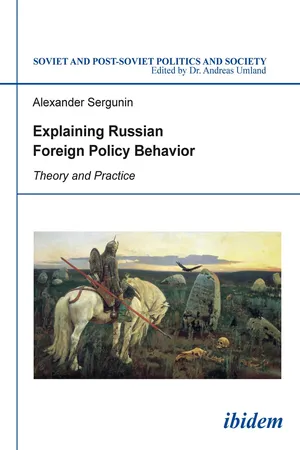![]()
Chapter 1.
Theorizing Russian Foreign Policy
Russian foreign policy has always been an "uncomfortable" or exceptional case for IR theorists. Theories which they have tried to apply to the study of Moscow's international course in the post-Cold war era worked poorly or did not work at all. Scholars, who want to apply Western theories to Russian foreign policy, often have to justify this against claims that Russia is sui generis and that empirical knowledge of Russia's history, culture and current policies are far more important to understand Moscow's international behavior than any theoretical sophistication. However, as we know from the history of science, it is useless and counterproductive to contrapose theory to empirical knowledge. Ideally, they should go hand in hand, and support each other. As some European experts on Russian foreign policy rightly note, "Without theoretical reflection research on Russian foreign policy risks to remain a branch of area studies that relies on descriptive approaches but at the same time is full of hidden commitments to dubious theoretical assumptions" (Forsberg et al. 2014, 262). To continue this way of reasoning, without theoretical foundations, research often lacks either the critical edge or credibility.
In this chapter, the most popular theoretical interpretations of the Kremlin's post-Soviet foreign policy are critically reviewed and some alternative explanations are suggested.
Power transition theory
The realist / neo-realist power transition theory (PTT) developed by A.F.K. Organski (1958) and his followers (Wittkopf 1997; Tammen 2000) is the most popular IR theory among the Western experts on Russia's foreign policy. This theory aims at explaining the causes of international conflicts and wars by the rise of emerging powers that are discontent with international rules established by the dominant powers. According to this theory, all states can be classified to one of two categories—either status quo or revisionist. Powerful and influential nations such as the U.S. who have benefited from the previously established world order fall under the category of status quo states while nations dissatisfied with their place on the international spectrum are often considered revisionist states. The PTT was based on the assumption that the revisionist state aims at either a radical change of old rules or imposing new rules on other international actors.
According to the PTT school, Putin's Russia is a typical revisionist state. For example, the experts from the U.S.-based Heritage Foundation believe that Russia poses four distinct, but related problems for the U.S. and other international actors: First, Putin's regime challenges core democratic values by combining a lack of respect for political, civil, and economic rights with a dysfunctional economy. Second and most dangerous for the West, Russia poses a series of worldwide strategic and diplomatic challenges, including buildup of its nuclear arsenal and military. Third, Russia poses threats to discrete U.S. allies and friendly regimes around the world, such as the Baltic States, Poland, Finland, Sweden, Georgia and Ukraine. Fourth, Russia's cooperation with "rogue" states (Iran, Syria, North Korea) and its increasing tendency to play a spoiler role pose another set of threats (Carafano 2015, 1).
The followers of the "revisionist" school believe that, in security affairs, Russia maintains a zero-sum view of the world. Absolute security is the goal, which if successful would mean absolute insecurity for everyone else. The belief in the military instrument is strong, and Russia has focused on rebuilding its military capability in the last decade. Use of force against smaller neighbors and illegal annexation is a part of the policy (Granholm et al. 2014, 10, 25).
In explaining the sources of Russia's foreign policy behavior, the "revisionist" school tends to reject any wrongdoings on the part of the West. The developments such as the NATO campaign in Kosovo in 1999 (and subsequent Kosovo's secession from Serbia), the U.S. missile defense program in Eastern Europe, U.S.- and EU-supported efforts to "promote democracy and good governance" in post-Soviet nations (which is called by the Kremlin a series of "color revolutions"), and above all the eastward expansion of NATO are not considered threatening Russia's security and a legitimate ground for Moscow's counter-reaction. This school accuses the Kremlin of having the aspirations to exercise a neo-imperial control over its neighbors and believing that those neighbors have no corresponding right to determine their own destiny. What the Russian regime could not tolerate, the protagonists of this school maintain, is quite simple: any independent sources of power on its borders or inside them that could resist the regime's will (Carafano 2015, 3).
The moderate version of the "revisionist" school tries to explain the radical change in Moscow's foreign policy behavior paradigm by the failure (or incomplete nature) of democratic reforms in post-Soviet Russia. These reforms derailed from a "proper" way and degenerated to a state / oligarchic capitalism model based on natural resources exports, centralism and dominance of kleptocratic bureaucracy. Such a regime has been reluctant to be integrated on globalized...
